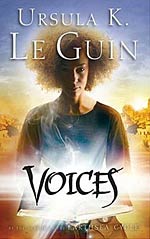
![]() Tar Daddoo
Tar Daddoo
5/26/2013
![]()
[This is the second of a trilogy of books. The first is Gifts, which I have reviewed here. Definitely start with Gifts.]
What is the Fantasy premise?
As in Gifts, we continue the notion that some people possess special capabilities. The character Gry returns with her ability to communicate with/control animals. Orrec is also present, but his gift is now that of storytelling, poetry, and oration. The focus of the story is a young girl named Memer. She is just coming of age in a turbulent time. It is unclear whether she has a gift or what exactly it might be.
Where does the Fantasy premise come from and what governs its use?
Gry's gift with animals is mostly the same as in the earlier novel, though possibly more powerful. Orrec's gift of storytelling is new, but frankly it is not altogether clear whether we should think of it as a magical gift or a personal talent. It is referred to as a gift, but in the same manner that we might call a musician gifted. There is a suggestion that gifts were common among the people who originally populated the Western Shore, but this is not really confirmed or pursued.
As for Memer, it is probably best to say very little. She is the focal point of the story. Her skills unfold slowly over the story.
Is the impact of the premise on an individual explored?
The story is about Memer's coming of age. She definitely grows, but that is as much due to circumstances and personality as any fantastical elements.
Is the impact of the premise on society explored?
Le Guin is definitely interested in this society and how it is changing, but the society and its changes are familiar analogs of historical societies and situations. The gifts may guide change, but they do not really control it.
How well written is the story?
The book is quite well written and easy to read. It continues our exposure to the Western Shore with a completely different and less secluded setting. What is surprising, though not disappointing, is how little magic or fantasy occurs in the story. As with the portrayal of Orrec's storytelling gift, it is almost as if Le Guin wants us to appreciate a thin line between magical powers and normal human talents.
Can I recommend the book?
I enjoyed this book and can recommend it to anyone who is prepared to commit to reading the full trilogy. Unlike Gifts, Voices provides a more complete and gratifying story. Like Gifts, however, Voices still leaves much to be explained. My copy of Powers, -- the third book -- will soon be on order.